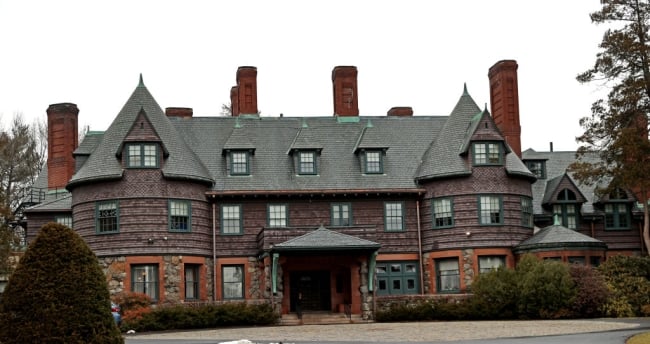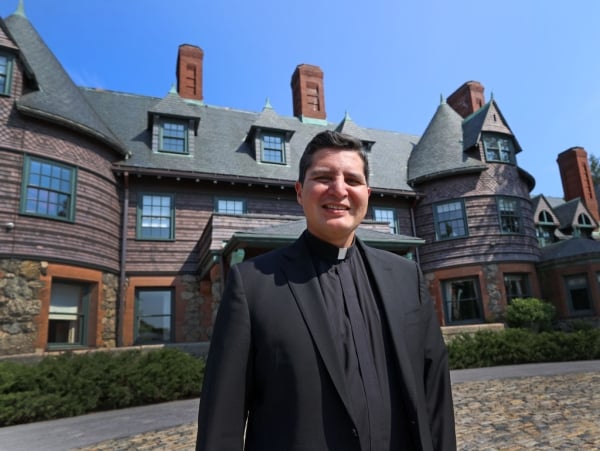You have /5 articles left.
Sign up for a free account or log in.

Boston College merged with Pine Manor College in 2020 and is using Pine Manor’s old campus to launch a two-year residential program for low-income and first-generation students.
Boston Globe/Getty Images
This summer, Boston College welcomed 110 students to its brand-new associate degree programs, part of the institution’s larger programming to support underrepresented students.
The two-year residential college, Messina College, will provide learners with holistic resources including a summer launch course, internship experience and supportive staff and faculty members. Students can also enjoy all of Boston College’s facilities and programs while enrolled.
The background: In 2020, Boston College merged with the small liberal arts college Pine Manor College, creating the Pine Manor Institute for Student Success. The institute has a $100 million endowment, half of which was committed by BC, to fund academic supports and programming for underrepresented first-generation students.
A majority of the inaugural cohort are from the Boston area or other cities in Massachusetts, according to a university release.
Pine Manor’s campus, about a mile and a half from the main campus, was renovated over the past year plus to accommodate the students, with Ashby Hall receiving the greatest face-lift: new classrooms, learning commons, kitchen and serving counter, a chapel, and offices for student services.
With Messina, Boston College joins a growing number of private religious universities that offer two-year colleges, including the University of St. Thomas and Loyola University Chicago.
On the ground: The college aims to enroll around 100 students each year, for a total enrollment of 200 learners.
Students can pursue an associate degree in one of four programs: applied data science, applied psychology and human development, general business, and health services. Each degree is 60 credits, or 20 courses. Courses will be taught by existing BC faculty members, as well as new professors, many with a passion for first-generation student success.
Throughout the experience, students are housed in Pine Manor’s suite-style dorms and can engage in all Boston College extracurricular activities including student organizations, campus recreation, campus ministry, libraries and sporting events. During the final semester of their second year, students will also complete a class on the main campus (which is accessible via public transportation, as students are not allowed to have cars on campus).

Messina College’s founding dean, the Reverend Erick Berrelleza, was a first-generation student himself, highlighting the college’s commitment to first-generation student success.
David L. Ryan/The Boston Globe/Getty Images
Students start classes earlier in the year, in July, as well, allowing them to space out courses throughout the term, lightening their course load.
The college will also provide internship experiences to learners through partnerships with various businesses and non-profits. Students will work 10 to 12 hours a week in their internships, and they will complete a three-credit seminar course to help them connect their internship experience to academic and professional goals.
In April, the college announced it had partnered with Liberty Mutual Insurance to provide paid internships to Messina students during their second year.
Messina also offers a 30-credit Foundations Program for around 10 BC applicants, giving them a one-year transitional program and wraparound supports but a guaranteed transfer to the college if they maintain a 3.4 GPA or recommendation from the dean. Offers of admission are extended to a select group of candidates—there is no application process.
Affordability: Part of Messina’s mission is to serve underrepresented students, including those from low-income backgrounds, so affordability is key to the college.
The posted tuition and fees for one year is $54,600 ($30,000 cheaper than Boston College’s traditional undergraduate program), but Messina’s need-based scholarship covers around $50,000 of those costs, with students agreeing to take on $2,000 in loans each year. For a family with a total income of $40,000, for example, students will pay nothing out of pocket up front.
Foundations Program students pay Boston College tuition (around $69,000) and housing rates.
There’s no application fee for Messina, further reducing costs associated with the program. There are also work-study positions available for learners once enrolled.
For those who cannot afford laptops, health insurance or their meal plans, the college will cover those costs, as well.
What’s next: Students arrived on campus July 7 and spent their first few weeks in the First-Year Discovery Seminar, led by faculty members, helping them successfully transition and prepare for their courses at Boston.
After completing their degree at Messina, any student with a 3.4 GPA or higher can transfer into a bachelor’s degree program at Boston College. Those who decide to transfer to a different institution will be supported by the college’s alumni network.
If your student success program has a unique feature or twist, we’d like to know about it. Click here to submit.
This article has been updated to clarify details about student internship opportunities, including student pay and partner organizations.




